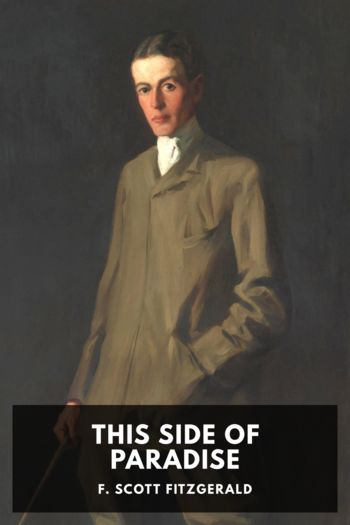This Side of Paradise, F. Scott Fitzgerald [best novels for teenagers TXT] 📗

- Author: F. Scott Fitzgerald
Book online «This Side of Paradise, F. Scott Fitzgerald [best novels for teenagers TXT] 📗». Author F. Scott Fitzgerald
During the five or ten minutes he waited in the shadow of the fence, there was somehow this fire … that was as near as he could name it afterward. He remembered calling aloud:
“I want someone stupid. Oh, send someone stupid!” This to the black fence opposite him, in whose shadows the footsteps shuffled … shuffled. He supposed “stupid” and “good” had become somehow intermingled through previous association. When he called thus it was not an act of will at all—will had turned him away from the moving figure in the street; it was almost instinct that called, just the pile on pile of inherent tradition or some wild prayer from way over the night. Then something clanged like a low gong struck at a distance, and before his eyes a face flashed over the two feet, a face pale and distorted with a sort of infinite evil that twisted it like flame in the wind; but he knew, for the half instant that the gong tanged and hummed, that it was the face of Dick Humbird.
Minutes later he sprang to his feet, realizing dimly that there was no more sound, and that he was alone in the graying alley. It was cold, and he started on a steady run for the light that showed the street at the other end.
At the Window
It was late morning when he woke and found the telephone beside his bed in the hotel tolling frantically, and remembered that he had left word to be called at eleven. Sloane was snoring heavily, his clothes in a pile by his bed. They dressed and ate breakfast in silence, and then sauntered out to get some air. Amory’s mind was working slowly, trying to assimilate what had happened and separate from the chaotic imagery that stacked his memory the bare shreds of truth. If the morning had been cold and gray he could have grasped the reins of the past in an instant, but it was one of those days that New York gets sometimes in May, when the air on Fifth Avenue is a soft, light wine. How much or how little Sloane remembered Amory did not care to know; he apparently had none of the nervous tension that was gripping Amory and forcing his mind back and forth like a shrieking saw.
Then Broadway broke upon them, and with the babel of noise and the painted faces a sudden sickness rushed over Amory.
“For God’s sake, let’s go back! Let’s get off of this—this place!”
Sloane looked at him in amazement.
“What do you mean?”
“This street, it’s ghastly! Come on! let’s get back to the Avenue!”
“Do you mean to say,” said Sloane stolidly, “that ’cause you had some sort of indigestion that made you act like a maniac last night, you’re never coming on Broadway again?”
Simultaneously Amory classed him with the crowd, and he seemed no longer Sloane of the debonair humor and the happy personality, but only one of the evil faces that whirled along the turbid stream.
“Man!” he shouted so loud that the people on the corner turned and followed them with their eyes, “it’s filthy, and if you can’t see it, you’re filthy, too!”
“I can’t help it,” said Sloane doggedly. “What’s the matter with you? Old remorse getting you? You’d be in a fine state if you’d gone through with our little party.”
“I’m going, Fred,” said Amory slowly. His knees were shaking under him, and he knew that if he stayed another minute on this street he would keel over where he stood. “I’ll be at the Vanderbilt for lunch.” And he strode rapidly off and turned over to Fifth Avenue. Back at the hotel he felt better, but as he walked into the barbershop, intending to get a head massage, the smell of the powders and tonics brought back Axia’s sidelong, suggestive smile, and he left hurriedly. In the doorway of his room a sudden blackness flowed around him like a divided river.
When he came to himself he knew that several hours had passed. He pitched onto the bed and rolled over on his face with a deadly fear that he was going mad. He wanted people, people, someone sane and stupid and good. He lay for he knew not how long without moving. He could feel the little hot veins on his forehead standing out, and his terror had hardened on him like plaster. He felt he was passing up again through the thin crust of horror, and now only could he distinguish the shadowy twilight he was leaving. He must have fallen asleep again, for when he next recollected himself he had paid the hotel bill and was stepping into a taxi at the door. It was raining torrents.
On the train for Princeton he saw no one he knew, only a crowd of fagged-looking Philadelphians. The presence of a painted woman across the aisle filled him with a fresh burst of sickness and he changed to another car, tried to concentrate on an article in a popular magazine. He found himself reading the same paragraphs over and over, so he abandoned this attempt and leaning over wearily pressed his hot forehead against the damp windowpane. The car, a smoker, was hot and stuffy with most of the smells of the state’s alien population; he opened a window and shivered against the cloud of fog that drifted in over him. The two hours’ ride were like days, and he nearly cried aloud





Comments (0)